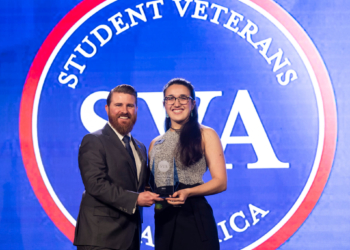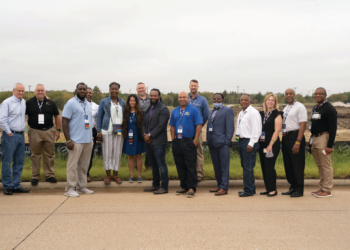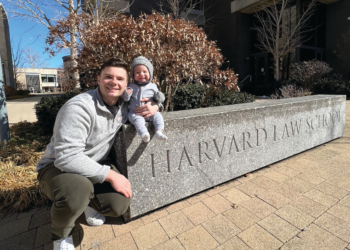I’ve been trained for combat, but nobody taught me how to be a student.
I arrived 15 minutes early for my first class and could hardly believe that more than half the class was late on the first day. An unforgivable sin in military culture, but I realized I had entered a different world.
Veterans can feel like Adam Sandler in “Billy Madison” going back to school, an out-of-place adult surrounded by children. We are nontraditional students — older, with more responsibilities, more likely to have families and more than 50% of student veterans have a service-connected disability.

On the battlefield, as well as in the classroom, momentum matters. Veterans who make it through their first year are more likely to make it to graduation.
At first, expect the adjustment to be a struggle because you’re transitioning to more than college. You’re also getting out of the military, moving around the country and coming back into civilian life. Veterans aren’t only on a path to the degree; college is preparation for a successful life after.
Don’t expect to just go to class and leave. You’re there to build connections, learn and recreate your identity after military service.
In the military, it’s what you know, but on the civilian side who you know matters more. The military is hard, but it’s simple. You know precisely where you fit in.
There isn’t a blueprint for college life, and like the military, strategy matters.
- Expect less structure: Nobody is going to pound on your door or call you if you don’t go. It’s up to you to make every class. Treat it like a military contract and each semester you re-up your obligation.
- Expect a financial delay your first semester: The housing allowance payment comes on the first and only on the first. Don’t bank on the money too early. Your economic health plays a lot into your mental health, so be prepared.
- Expect to call for support: Every institution has tutors and academic assistance. Especially if you’ve been out of school for a while, do you remember any high school algebra? Work to develop healthy relationships with your advisor, professors and faculty.
- Expect to be the only veteran in the room: You might be the only veteran your classmates have ever met. It takes effort to fit in, but it’s necessary because isolation is as dangerous as combat. Make friends, get involved and be patient with your peers if they aren’t up to military standards.
- Expect anti-military civilian sentiments: Your peers, professors and even society can have differing views on veterans, the military and our conflicts. Lots of comments are more ignorant than malicious and not everyone is going to have a patriotic outlook.
College provides a healthy bridge between the military and civilian world. It’s easy to fall off, but the best advice for any student veteran is to find a mentor to lean on. Take your good military habits into college by getting up early, looking the part, working on a team, exercising, sitting in front and fighting to win.
College is for discovery, fun and growth — but expect it to be exactly what you make it. Don’t forget to enjoy yourself while you’re there. No lives are on the line. Nobody’s going to yell at you. And you know your schedule.
You earned the Post-9/11 GI Bill, but all it gives is the opportunity, not the degree. If you made it through the military, you can handle college by utilizing your military mindset.








































